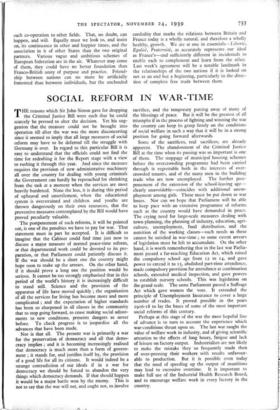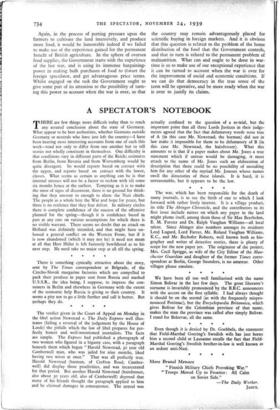SOCIAL REFORM IN WAR-TIME
THE reasons which Sir John Simon gave for dropping the Criminal Justice Bill were such that he could scarcely be pressed to alter the decision. Yet his sug- gestion that the measure could not be brought into operation till after the war was the more disconcerting since it seemed to imply that all large measures of social reform may have to be deferred till the struggle with Germany is over. In regard to this particular Bill it is easy to understand that the officials could not find the time for redrafting it for the Report stage with a view to rushing it through this year. And since the measure requires the provision of new administrative machinery all over the country for dealing with young criminals the Government can hardly be reproached for shrinking from the task at a moment when the services are most heavily burdened. None the less, it is during this period of upheaval and unsettlement, when the educational system is overstrained and children and youths are thrown dangerously on their own resources, that the preventive measures contemplated by the Bill would have proved peculiarly valuable.
The postponement of such reforms, it will be pointed out, is one of the penalties we have to pay for war. That statement must in part be accepted. It is difficult to imagine that the Cabinet could find time just now to discuss a major measure of normal peace-time reform, or that departmental work could be devoted to its pre- paration, or that Parliament could patiently discuss it. If the war should be a short one the country might hope soon to make up the arrears. On the other hand, if it should prove a long one the position would be serious. It cannot be too strongly emphasised that in this period of the world's history it is increasingly difficult to stand still. Science and the provision of the apparatus of life have moved quickly ; the organisation of all the services for living has become more and more complicated ; and the expectation of higher standards has been so sharpened in all classes in the community that to stop going forward, to cease making social adjust- ments to new conditions, presents dangers as never before. To check progress is to jeopardise all the advances that have been made.
Nor is that all. The present war is primarily a war for the preservation of democracy and all that demo- cracy implies ; and it is becoming increasingly realised that democracy is much more than a form of govern- ment ; it stands for, and justifies itself by, the provision of a good life for all its citizens. It would indeed be a strange contradiction of our ideals if in a war for democracy we should be forced to abandon the very things which democracy demands If that should happen it would be a major battle won by the enemy. This is not to say that the war will not, and ought not, to involve sacrifice, and the temporary putting away of many of the blessings of peace. But it will be the greatest of all triumphs if in the process of fighting and winning the war the country can keep its grasp firmly on the conditions of social welfare in such a way that it will be in a strong position for going forward afterwards.
Some of the sacrifices, real sacrifices, are already apparent. The abandonment of the Criminal Justice Bill at the time when its passing was so important is one of them. The stoppage of municipal housing schemes before the overcrowding programme had been carried through is regrettable both in the interests of over- crowded tenants, and of the many men in the building trade who are now unemployed. The further post- ponement of the extension of the school-leaving age— clearly unavoidable—coincides with additional unem- ployment among girls. These must be put down as war losses. Nor can we hope that Parliament will be able to keep pace with an 'extensive programme of reforms such as the country would have demanded in peace. The crying need for large-scale measures dealing with town-planning, the planning of industry, education, agri- culture, unemployment, food distribution, and the nutrition of the working classes—such needs as these cannot be satisfied in war-time ; to some extent arrears of legislation must be left to accumulate. On the other hand, it is worth remembering that in the last war Parlia- ment passed a far-reaching Education Act, which raised the compulsory school age from 12 to 14, and gave power to extend it to 15, abolished part-time attendance, made compulsory provision for attendance at continuation schools, extended medical inspection, and gave powers to establish nursery schools. This was legislation on the grand scale. The same Parliament passed a Suffrage Act which gave women the vote. It extended the principle of Unemployment Insurance to cover a large number of trades. It proved possible in the years 1916-18 to lay the bases of some of the most important social reforms of this century.
Perhaps at this stage of the war the most hopeful line of advance is to turn to account the experience which war-conditions thrust upon us. The last war taught the value of welfare work in industry, and of giving scientific attention to the effects of long hours, fatigue and lack of leisure on factory output. Industrialists are not likely to make the mistake they so frequently made then of over-pressing their workers with results unfavour- able to production. But it is possible even today that the need of speeding up the output of munitions may lead to excessive overtime. It is important to make full use of the Industrial Health Research Board, and to encourage welfare work in every factory in the country. Again, in the process of putting pressure upon the farmers to cultivate the land intensively, and produce more food, it would be lamentable indeed if we failed to make use of the experience gained for the permanent benefit of British agriculture. In the sphere of oversea food supplies, the Government starts with the experience of the last war, and is using its immense bargaining- power in making bulk purchases of food to thwart the foreign speculator, and get advantageous price terms. Whilst engaged on the task the Government ought to give some part of its attention to the possibility of turn- ing this power to account when the war is over, so that the country may remain advantageously placed for scientific buying in foreign markets. And it is obvious that this question is related to the problem of the home distribution of the food that the Government controls, and that in turn is related to the permanent problem of malnutrition. What can and ought to be done in war- time is so to make use of our exceptional experience that it can be turned to account when the war is over for the improvement of social and economic conditions. If we can do that democracy in the true sense of the term will be operative, and be more ready when the war is over to justify its claims.





































 Previous page
Previous page